As a parent, you want to do everything you can to care for and protect your kids from the negative effects of divorce. So what's the best way for how to tell children about divorce?
What are some good ways for helping children cope with divorce?
And finally, when it comes to divorce and its effects on children, what do kids understand based on different ages and developmental stages? How as divorcing parents can you spot and address problems?
This post is all about divorce with children.
What are some tips for how to tell children about divorce?
Telling kids about divorce or separation is a difficult conversation, but an essential one that shouldn't be delayed. Kids are smart, and may very well sense the tension at home, so it's important for mom and dad to address their concerns as soon as possible.
I recommend that couples going through a divorce with kids first create a plan as to how and when to break the news and tell the children about their divorce. Ideally, the conversation should happen in person, with both parents and all children present.
Divorcing parents should also anticipate any questions their kids may have and how to answer them. Children may need some time to process the news, so make sure to let them know that they can talk to either parent whenever they need to.
If your young child is having trouble coping with the divorce, a therapist can help them develop tools to work through their feelings during this difficult time.
- Nathalie C. Theodore, JD, LCSW
When deciding how to tell kids about an impending divorce, the most important message to be conveyed is that the children are loved, and that it is the kind of love that will never end, regardless of what happens between the parents.
However, what comes after that should largely be determined based on the ages of the children. Children process and understand things, particularly a complicated issue like divorce, very differently depending on their social, emotional, and cognitive development.
Any information given should be clear and honest, but should not surpass their level of understanding (e.g., a five-year-old does not need a detailed explanation of the nuances of adult relationships, but a teen may need more clarification on the emotional complexities of the situation.)
Prior to the conversation, parents would be well-served for helping children with divorce by consulting resources (therapists, educators, books) to better understand divorce and its effects on children based on developmental stages and determine the most appropriate approach for each child.
- Kate Engler, LMFT, LPC
Ways of telling kids about divorce and how to help a child deal with divorce before, during and after the process
How to Tell Children About Divorce:
"If you're a couple divorcing with young kids, you should prepare a narrative that you and your spouse can agree on and present this to your children together. Throughout the discussion, remind your children that although you and your spouse will no longer be husband and wife, you will always be their mom and dad.
Helping Kids with Divorce During the Process:
Prepare them for the potential of what is to come, reminding them all along the way that they will always be taken care of. Avoid bad mouthing your partner and encourage your children to be open with both of you about questions or concerns.
Helping Kids Deal with Divorce After the Process:
Encourage them to discuss new traditions they might want to have that are unique to this new chapter in your lives and parent-child relationships. Remind them of routines that will stay the same so that your children can still feel they live in a structured, predictable environment.
As a single parent, it will be very important for you to build a support network with individuals you can rely on to encourage you through this adjustment in life and help you transition into your new normal. Consider reaching out to a family therapist or mental health professional to establish a positive co parenting dynamic with your ex."
- Erin Fisher, MSW, LSW
The best way to tell kids about divorce is to prepare in advance
When telling their children they are divorcing, parents should recognize that the children just remember the first two sentences.
But then after that, that’s where the children’s questions might start coming in. So over time, they'll start asking more and more - sometimes out of the blue.
So parents should be prepared for talking to the kids at that point as a question comes up. And to be answering honestly and age appropriately for what the children ask and are capable of processing based on their age and maturity level. This approach can really help children dealing with divorce.
- David Klow, LMFT
How to tell kids about divorce in healthy and loving ways
When it comes to how to tell children about divorce, couples should make sure that they communicate to their children that the their decision to divorce had nothing to do with them.
It is not unusual for children to have the false belief that, if they had done this or if they hadn’t do that – the divorce or separation would not occur.
It’s very important that parents emphasize this, and remind them that both parents love them and plan to be actively involved in all aspects of their lives, in spite of the impending changes.
Also, separated parents should avoid making critical comments about the other parent or be meddling to find out information about the other parent. This puts children in the role of ‘an informant,’ which will not only give the child anxiety, but is developmentally detrimental.
Children and families can feel a range of feelings including sadness, anger, confusion, hurt, fear or even relief and that will continue to be at a pretty high level up through the first year and even into the second year depending on the situation. So parents should expect and accept a wide range of emotional response to the separation and divorce for up to two years because that is normal.
- Dr. Pamela Brand, Psy.D., LMFT
I think one of the main things going into how to tell kids about divorce it is having a very thoughtful conversation with them as soon as it’s sort of determined what’s going to happen.
Kids do better if they know definitively what's going to happen instead of telling them you don't know yet what's going to happen.
So for example, if one parent is deciding to move out, it’s much better for parents to wait until they know, 'Yes, dad is going to move out. He’s going to live in this apartment down the street. That’s how it's going to be.'
And then during the divorce process, just making every effort to never use the kids in any negative way.
They are going to be in the middle and there is not a way for them to not feel a pull of loyalty kind of split and feel like they are kind of hurting one or the other parent during the process by whatever actions they take.
But helping them in any way possible by never bad mouthing the other parent and making every effort to take the high road whenever possible. That is a good way for helping kids deal with divorce.
- Josh Hetherington, LCPC, LMFT
How to Tell Kids about Divorce? Be Honest.
"The best advice I could give someone on how to tell children about divorce or separation is for both parents to sit them down and tell them face-to-face.
Be direct, be honest, and let them know if they have any questions, they can talk to either of you at any time.
And if you're unsure about what to say to them based on their age, there are plenty of resources out there, including many of the professionals included in this article, who can guide you in doing just that.
This is something you definitely want to get right in my opinion!
In my case, my parents made the incorrect assumption that because I was 'just a kid,' I had no idea what was going on. I had eyes and ears and I wasn’t dumb.
I heard every fight. I knew dad was sleeping in the study instead of in the bedroom with mom. I knew family dinners were no longer a thing. And that dad came home after we were asleep to avoid having to interact with mom.
As a young child, you sit there thinking, 'Is this normal?' or worse yet, 'Did I do something to cause this and am I to blame?' This was my role model for what a marriage looked like – and it wasn’t a good one. But what did I know? These were my parents. I haven’t been told anything’s wrong so I’ll go on assuming everything is OK.
Until one day it isn’t.
Want to know how I found out my mom and dad were getting a divorce?
I had been sleeping at my best friend’s house on a Friday night. And when I came home the following morning, I saw my mom crying on the floor by our front door, and my dad driving away in a car filled with his possessions.
He didn’t even say goodbye to me.
Your kids are smarter and a lot more perceptive than you might think – no matter what age they are.
Maybe you think you’re protecting them by not telling them your marriage has ended. But I can tell you from experience, it’s the not knowing that’s the worst in this difficult time."
- Joe Dillon, MBA
Tips for helping children cope with divorce
"Divorce is difficult for everyone and during the entire process it is important to keep your kids in mind. They have the least amount of power in this situation and can often feel out of control as their life drastically changes.
Here are some tips for supporting children dealing with divorce and making this process as smooth as possible from a child perspective:
If you're divorcing with kids, reduce the level of conflict.
Research shows that the main things that dictates how well kids recover from their parents’ divorce is the level conflict between the parents. You are getting a divorce for a reason. Clearly your relationship is not working out. However, despite the negative feelings you are experiencing towards your partner, make sure that you are being as cordial as possible. Don’t fight or discuss legal matters in front of your kids.
Never speak negatively about your ex-spouse in front of the kids or to the kids.
Despite how you may feel about your ex-spouse, your kids love them and it is very confusing to hear negative things about their mom or dad.
When going through a divorce with kids, work with your ex-spouse on parenting.
Despite the fact that your marriage didn’t work out, you still have the joint job of raising your kids. Do your best to work as a team on this. View them as a co-worker whose input you need to complete a very important project successfully.
How children deal with divorce varies so use age appropriate language.
Keep in mind that this whole process is very confusing for your kids. When talking about your divorce, use simple language to explain what is happening.
When telling kids about divorce, be prepared for questions.
Not all kids will have lots of questions but many will have some. Answer them as honestly as possible while not blaming other person.
Whether you're divorcing with young kids or adolescents, make your kids feel safe.
Remind them that you will always love no matter what. Encourage them to share their feelings and validate them. Keep their routine as normal and predictable as possible.
Helping kids cope with divorce is easier if you create a strong support system.
Let teachers and school counselors know what the kids are going through so they can pay attention to any signs of distress. Coach grandparents, aunts/uncles and other important people in the kid's life on how to speak with them or answer any questions that they may have. Don’t be afraid to seek professional help when needed and for any reason."
- Irene Schreiner, LMFT
Helping a child dealing with divorce through family meetings
One option for helping kids with divorce is for mom and dad to hold weekly or as needed family meetings to discuss their children’s concerns and feelings and to reassure them together.
In this fashion, both parents can reassure the children that they will continue to have intact and satisfying relationships with each parent, even though the shape of their family is changing.
Through the family meeting process, the children will learn that they can express all of their feelings during that time and/or whenever they need.
- Laura Alper, MSW, LCSW
"Parents going through a divorce often wonder if their children will be damaged, traumatized, or negatively affected in a profound way.
What gets families through this difficult time? Monitoring the level of conflict between parents, parents being aware of their own emotional well-being, getting support, and keeping an eye on each kid's adjustment.
Keep the conflict away from the kids.
We know that too much conflict in front of the kids can be damaging. But it may be impossible to avoid exposing the kids to some argument, so try not to deny the conflict that they observe - it's how you explain it that matters.
Name and validate the experience - that it is tense right now. If you deny that there is conflict, their reality and perspective is distorted - what they sense, see and hear is inaccurate.
Be aware of your emotional world.
It is normal for parents to experience an emotional roller coaster during a divorce - anger & resentment, sadness & depression, grief & loss. Try to stay present of your emotional states and take care of yourself.
When kids are overly concerned about their parents' well-being, they stop being kids. Children need to focus on their developmental tasks and not be disproportionately worried about their parents.
Get support and rely on your community.
It's critical that parents going through this scary and potentially lonely time get support - for validation, perspective and hope. And inevitably to vent about their "ex".
How are the kids adjusting?
Some kids will be caretakers, some will regress, while others will withdraw. Encourage your child to share any feelings and also be prepared for them not to be able to articulate their confusion. They are generally concerned with being able to see their friends, go to the same school, see both parents, know that there is enough money to support them, and know if any major moves are going to happen.
Encourage their questions, be transparent where appropriate, don't offer false hope if you are certain that the marriage is over, and keep as much consistency and routine as possible."
- Jennifer Campoy, LCSW
Practical Tips for Helping Children Cope with Divorce
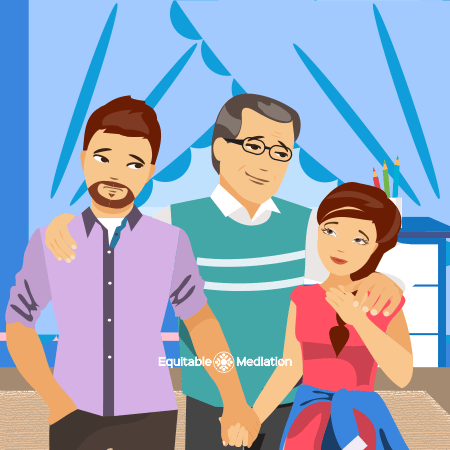
By Jackie Printon
As a therapist, I’ve had the privilege of working with parents who are contemplating divorce as well as kids who are already adjusting to a split.
Parents are usually well-intentioned and try to anticipate divorce and the effects on children, while kids come in after the separation and share the stressors they are actually dealing with.
Here are some observations from both sides, in an effort to inform parents on helping children with divorce.
Helping Kids Cope with Divorce
“I don’t want the divorce to ruin their lives!”
Divorce will have an unavoidable effect on kids and the effect of divorce will vary based on the child’s developmental stage, personality, the amount of change brought about by the divorce and the behavior of the parents.
Also, the way each child experiences the divorce may change with time, possibly throughout his entire life.
The best thing parents can do as far as how to help a child deal with divorce is to make a concerted effort to mitigate that effect and, whenever possible, try to look at things from the child’s perspective and point of view.
 For a younger child, parents are the center of their world. They may feel sad about the changes in the family and worry that they did something to cause it.
For a younger child, parents are the center of their world. They may feel sad about the changes in the family and worry that they did something to cause it.
Kids this age are very inquisitive and may ask many questions. The child's behavior may regress and they may be extra clingy. Their vivid imaginations, while a wonderful trait, allows them to create scary scenarios in their minds, without the ability to calm these fears with reason.
To help your child dealing with a pending divorce, reassure, soothe and let them know you love them and that mommy and daddy will take care of them no matter what.
When it Comes to How to Tell Your Kids about Divorce, Older Children May React Very Differently than Young Children.

An older child may feel angry and resentful that their lives have been disrupted by custody arrangements, financial stresses, moving, and additional responsibilities.
Since their peer relationships are central, they may balk at a living arrangement that interferes with their social life and may be much less excited than younger siblings to be spending time with their mom or dad.
Parents can feel hurt by this reaction but it’s important for them to realize that their teens are just doing the work of their developmental stage - pulling away from their parents, moving towards peers and developing a sense of themselves as individuals.
Don’t make them feel guilty for wanting to see their friends instead of you - make an effort to compromise so they can do both.
They still need you, but in a different way than when they were younger. If parents can be flexible in balancing their custody arrangements with the social needs of their child, the relationship will be stronger.
But don’t expect a thank you.
How to Help a Child Deal with Divorce
“What should I tell my child when they ask why we are getting divorced?"
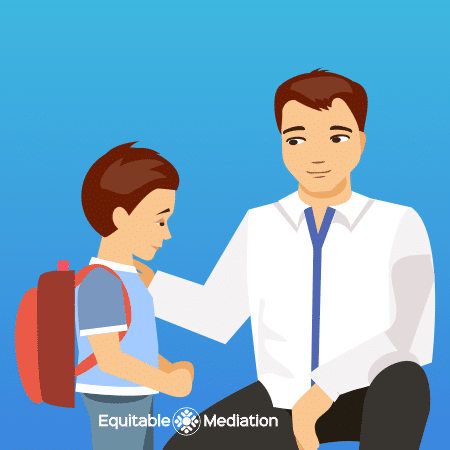 Think ahead of time about an age-appropriate explanation that reassures your children and alleviates their fears but doesn’t burden them with information they don’t need.
Think ahead of time about an age-appropriate explanation that reassures your children and alleviates their fears but doesn’t burden them with information they don’t need.
Kids need to know that they are loved, that they aren’t to blame and that both parents are committed to doing everything possible to keeping their lives stable. Allow some time for the information to sink in.
Don’t forget, you may have been making the decision to divorce for years, and may have all the details worked out, but it’s completely new information for them. They may react with strong emotions, have a lot of questions or shut down completely.
No matter what their reaction, reassure them that their feelings are completely normal. If they don’t want to talk about it right away, give them some space and let them know you are available to answer their questions as they come up.
Don’t share details of your marital problems, even with an adult child.
Kids don’t need to know that Mom had an affair or that Dad cared more about his career than his family.
Oversharing leads to confusing emotions that children aren’t equipped to deal with, and can evoke negative feelings about a parent that ultimately feel terrible to the child. If you need to vent about your ex, tell a friend, join a support group or see a therapist.
On the other hand, if your ex is behaving in a way that’s blatantly hurtful to you or your kids, don’t make excuses for it or pretend it’s fine, as this denies the reality of what they are seeing. If you find you are having a hard time managing all this, seek guidance from a professional.
Helping Children Cope with Divorce
“I don’t want my child to be stressed out.”
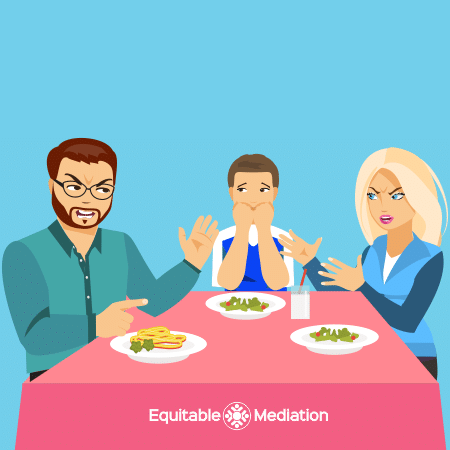 You know what stresses kids out? Moving between two homes and needing to constantly remember, organize and pack all things related to school, sports, music lessons, play dates, etc.
You know what stresses kids out? Moving between two homes and needing to constantly remember, organize and pack all things related to school, sports, music lessons, play dates, etc.
In our over-scheduled world, most kids need a lot of support staying organized. When you add a custody arrangement and another home into the mix, things can unravel quickly, leaving parents frustrated and kids stressed. It’s very mentally demanding for kids to remember where they are going each day and what they will need.
Come up with a system to make it easier, be patient and help them out - they need it!
Also, don’t put your child in the middle of financial or custody disagreements and don’t make your child the messenger. Agree from the beginning to communicate with your ex about these issues in a way that doesn’t involve your kids.
If your daughter says, "Dad says he won’t pay for my soccer camp,” resist the urge to unleash the anger that you feel at your ex onto your child. Instead, say something like, “Please don’t worry about this now. I’ll discuss this with your dad and we’ll try to work it out”.
Helping Kids with Divorce When Parenting Styles Conflict
“We parent very differently. They will be so confused.”
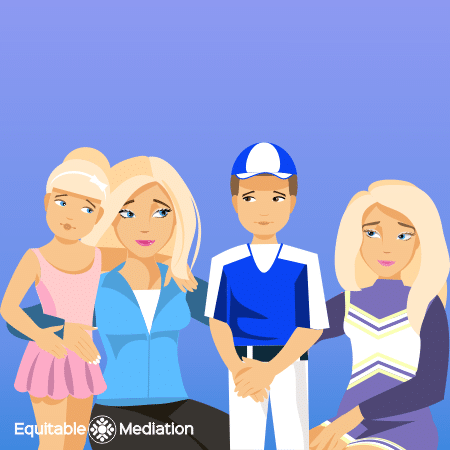 Kids are resilient.
Kids are resilient.
Unless a parent is abusive, neglectful, or exposing their kids to things that are very inappropriate, kids usually do fine with different parenting styles.
Don’t forget, they’re already used to it - they likely dealt with differences while you were married.
As much as possible, it’s important to let the other parent do their thing with minimal involvement from you. Your ex may not do things the same way you do- chores, meals, bedtimes, etc., but as long as you are both caring and consistent with your own parenting style, kids usually adjust pretty well.
Help Your Child Dealing with Divorce by Getting Them to Open Up
“I think my child is struggling, but he won’t talk to me.”
 If your kids seem angry, depressed, or their grades are dropping in school, acknowledge that the divorce has been hard on every family member and, as their parents, you want to ensure they have the support they need.
If your kids seem angry, depressed, or their grades are dropping in school, acknowledge that the divorce has been hard on every family member and, as their parents, you want to ensure they have the support they need.
Do not make it seem like there is something wrong with them!
Instead, validate that they may be feeling strong emotions that they may not feel comfortable sharing with you and then encourage them to talk to someone. You can also model this for them through your own actions.
If you’ve sought support from a friend or therapist during this process, share this with your children. It will let them know that even adults need help getting through divorce and other difficult situations, and everyone needs someone to talk to sometimes.
To sum it up, when it comes to divorce with children, there is much that parents can do to lessen the impact that divorce has on their kids.
What kids need more than anything is reassurance that they aren’t to blame, that they are loved, that they will still see both parents, and that parents can handle anything they (the kids) are feeling.
 Jackie Printon is a therapist who believes in the inner strength and resilience of every client and she specializes in helping adolescents and adults manage relationships and challenging life transitions. She also treats the effects of relational trauma and those struggling with symptoms of PTSD.
Jackie Printon is a therapist who believes in the inner strength and resilience of every client and she specializes in helping adolescents and adults manage relationships and challenging life transitions. She also treats the effects of relational trauma and those struggling with symptoms of PTSD.
If you live in Montgomery, Skillman, Hopewell or the general Princeton, NJ area and would like to learn more about Jackie Printon and the wonderful work she does, visit www.pmillertherapy.com.
Divorce and it's Effects on Children: The Different Age Stages
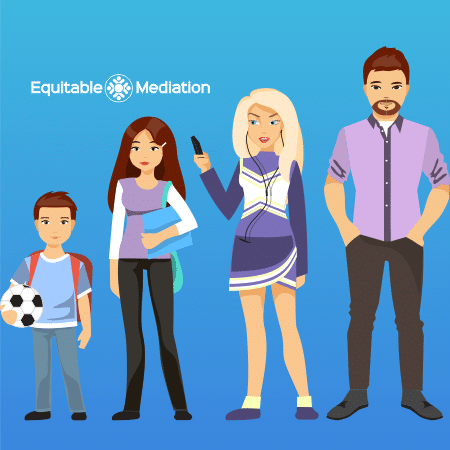 Original author/source of this article unknown
Original author/source of this article unknown
“If you are or know the original author of this article, please contact us for proper credit.”
Infant Children and Divorce: Birth to 18 Months:
Trust/Physical Needs:
One of the most important developmental stages that people go through in life is the developmental stage known as trust. This is one of the first things infants begin to learn.
It is very important because infants are dependent on their parents, and the dependency continues to strengthen throughout the parent-child relationship. These bonds need to be formed in order for the children to feel a sense of physical comfort and to minimize fear about the future.
The amount of time spent with the children determines the formation of bonds.
It is not a given that a child will develop these very important trusting bonds with the parents, but it is very critical that the parents actively pursue establishing these bonds in order for their children to properly develop emotionally as they mature.
Tension in the Home
Children at this age are able to detect that there is some tension, but they cannot understand the reasoning behind the conflict.
If tension continues, the child may appear to be nervous, especially around new people. Children may become edgy and will exhibit emotional outbursts frequently. They may show some delays in many types of development.
It is recommended that if a child is exposed to frequent tension, the parent should spend some time holding the child. The child needs to know that things aren't bad. If the symptoms worsen then it is time for the parent to consult a doctor.
Possible Reactions:
- Uneasy stomach
- Irregular eating habits
- Loss of appetite
Remedy Ideas for Parents when helping child cope with divorce:
- Maintain a normal routine
- Rely on friends and family for help
- Provide the child with his or her favorite toys or security items
- Make sure you get your rest so you are alert when he or she is awake.
Young Children and Divorce (Toddlers): 18 Months to 3 Years:
Individual Personality:
This is the age when children are starting to develop their own individual personalities. They realize that they are separate entities from their parents.
At this age, children are also very talkative, and they are very interested in environment exploration. Independence is being recognized.
Tension in the Home
At this age their main bond is with their parents.
Change in the environment at this age can be very difficult for a child; they need predictability and a stable environment. Children want immediate needs met, even if there is tension at home. The child's world is centered on themselves, so they will not totally concern themselves with the tension that is going on in the home.
Divorce at this age can be very difficult for the child, but it is possible for parents to overcome this difficult task if they work together. They need to develop a routine that the child can follow with little resistance.
If the divorce occurs at this age, the parent must be aware that the child may feel responsible for the break up. Parents must talk about it with the child.
Possible Reactions in Child Behavior:
- An increase in crying
- Wanting more attention than usual
- May discover anger and not understand it
- Difficulties sleeping Irregular habits forming
Remedy Ideas for Parents and How to Make Divorce Easier on Toddlers:
- Have a normal routine
- Be very nurturing, extra attention
- Spend quality time with the child
- Do not show tenseness with actions
- Look to friends and relatives to spend some time with the child
Preschool Children and Divorce: Ages 3 to 5 Years
Cognitive Development:
Children at this age are beginning to know and explore a great deal of their environment.
They are learning an enormous amount of new words and their level of thinking is becoming more complex. They believe that they are in total control of their environment, which can pose a problem for parents who want a divorce.
When it comes to divorce and young children, the child may feel as though they are responsible for the divorce and if this is the case, they feel no power in controlling the outcome.
How to Handle it:
Pre-schoolers don't understand the whole concept of divorce, nor do they want to see their parents separate.
No matter how extreme the tension is in the home, the child will ultimately feel responsible for the separation. Remember, it is important for the parents to handle the divorce in an open manner.
If the child sees that the parent is adjusting to the divorce positively then the children will most likely adjust to it positively. It's important that the parent reassure with physical and verbal affection. Children really need someone to talk to.
Possible Reactions:
- Uncertain feelings about the future
- Feeling a sense of responsibility
- Keeping anger trapped inside
- Nightmares may start
- Unpleasant thoughts or ideas
Remedy Ideas for Parents on How to Help Your Child Through a Divorce:
- Read books to your child
- Set-up specific time for them each day
- Encourage your child to talk
- Ensure his or her safety
- Ensure visitation with estranged spouse
- Encourage visitation if it is needed
Young Children and Divorce (Elementary School Years): Ages 6 to 11
Peer Interaction:
At this age children are introduced to an ever increasing amount of peer interactions, and they may begin to become a little distant.
For early elementary school children, the onset of divorce can be a very difficult obstacle to overcome.
As the children get older, hopefully they begin to realize that their parents did not abandon them. They will only realize this if the parents are open in talking with the children.
Certainly elementary school children feel extreme loss when a divorce occurs, but it is not impossible for the parents to rebuild the child's sense of security. Children interact with an ever increasing amount of new people and they may come home with controversial questions about certain issues concerning the divorce.
Typically a child's only wish at this age is for parents to reunite, and they may attempt to accomplish this task on their own.
Problems with the Divorce
If the children grew up in a nurturing environment, it will only be normal for them to fear being abandoned when a divorce takes place. Both parents must reassure the children that neither parent is going to abandon them.
Younger children do not understand the concept of divorce, and they may feel that the parents are divorcing them. Parents should explain that parent separation does not result in losing a parent.
Children are always aware of what is going on in the home, and they are generally aware that they have no control over the divorce. Some children at this age may blame one parent for the separation, and it is crucial for the emotional stability of the child that both parents explain to the child that the blame is not on either parent.
Parents should maintain a regular schedule because predictability is healthy for the child. Finally, openness about the situation is very critical for the child's emotional development.
Possible Reactions:
- Believes divorced parents are getting back together
- Feels rejected by parent who left the house
- Feels insecure financially and about the future
- Looks back all the time to what was
- Plays sick to stay home from school
- Feels abandoned and alone
Remedy Ideas for Parents to Help Children Cope with Divorce:
- Try to get the child to open up
- Share your emotions
- Spend quality time with each other
- Reassure safety
- Reassure the family atmosphere as much as possible
- Respect the child and his or her privacy
- Talk about things of mutual interest other than the problems
- Encourage outside school activities
Divorce and Teenage Children (Early-Late Adolescence): Ages 11 to 18 Years
Identity of Self/Increasing Interaction with Peers Early Adolescence:
At this stage, children are becoming more abstract thinkers. They are beginning to develop and discover their own identities. Older kids are now starting to move away from the security of the home.
It's not so much a time of rebellion, but a time of exploration. The focus of their lives, no longer on the home and parents, it is now on peers.
The adolescent is very aware of what is going on in his or her parent's lives. Not only are they aware of what surrounds them, but they also are very critical about the situation.
Most of the time, they will not accept divorce as an answer.
Later Adolescence:
At this time the adolescent is ready to be launched out into the environment where they will gain total independence. Peers and school become more important than family. However, a separation between parents would emotionally hurt the adolescent.
Before they leave for college, much of the time teenagers spend at home is time they wish to spend alone. The later adolescent's thinking skills are becoming more finely tuned as they are slowly becoming adult abstract thinkers. Divorced parents should still be there to provide their children with guidance, even though they may not always want it.
Possible Reactions:
- Feels anger and hatred
- May try to take advantage of both parents
- Behavior is very unpredictable
- Feels alone
- Tries to push the blame on one parent
- Feels more mature than others
- Financial worries
Remedy Ideas for Parents Helping Child Through Divorce:
- Keep up as much communication as possible
- Share as many experiences as possible
- Keep an eye out for the child's actions with school, etc.
- Do not involve the child in parental disputes
- Consider family counseling
- Watch your actions regarding new relationships
- Have household rules and maintain them
Other Useful Resources:
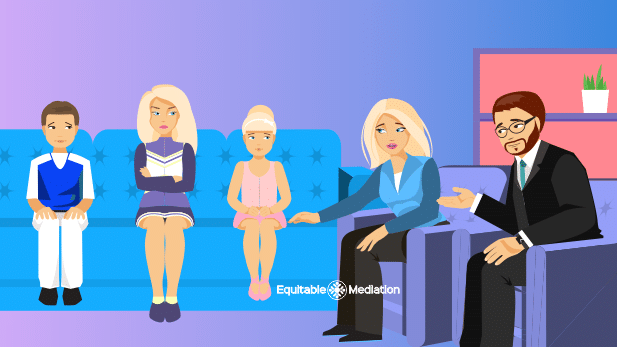



 For a younger child, parents are the center of their world. They may feel sad about the changes in the family and worry that they did something to cause it.
For a younger child, parents are the center of their world. They may feel sad about the changes in the family and worry that they did something to cause it.
 Think ahead of time about an age-appropriate explanation that reassures your children and alleviates their fears but doesn’t burden them with information they don’t need.
Think ahead of time about an age-appropriate explanation that reassures your children and alleviates their fears but doesn’t burden them with information they don’t need. You know what stresses kids out? Moving between two homes and needing to constantly remember, organize and pack all things related to school, sports, music lessons, play dates, etc.
You know what stresses kids out? Moving between two homes and needing to constantly remember, organize and pack all things related to school, sports, music lessons, play dates, etc. Kids are resilient.
Kids are resilient. If your kids seem angry, depressed, or their grades are dropping in school, acknowledge that the divorce has been hard on every family member and, as their parents, you want to ensure they have the support they need.
If your kids seem angry, depressed, or their grades are dropping in school, acknowledge that the divorce has been hard on every family member and, as their parents, you want to ensure they have the support they need. Jackie Printon is a therapist who believes in the inner strength and resilience of every client and she specializes in helping adolescents and adults manage relationships and challenging life transitions. She also treats the effects of relational trauma and those struggling with symptoms of PTSD.
Jackie Printon is a therapist who believes in the inner strength and resilience of every client and she specializes in helping adolescents and adults manage relationships and challenging life transitions. She also treats the effects of relational trauma and those struggling with symptoms of PTSD. Original author/source of this article unknown
Original author/source of this article unknown